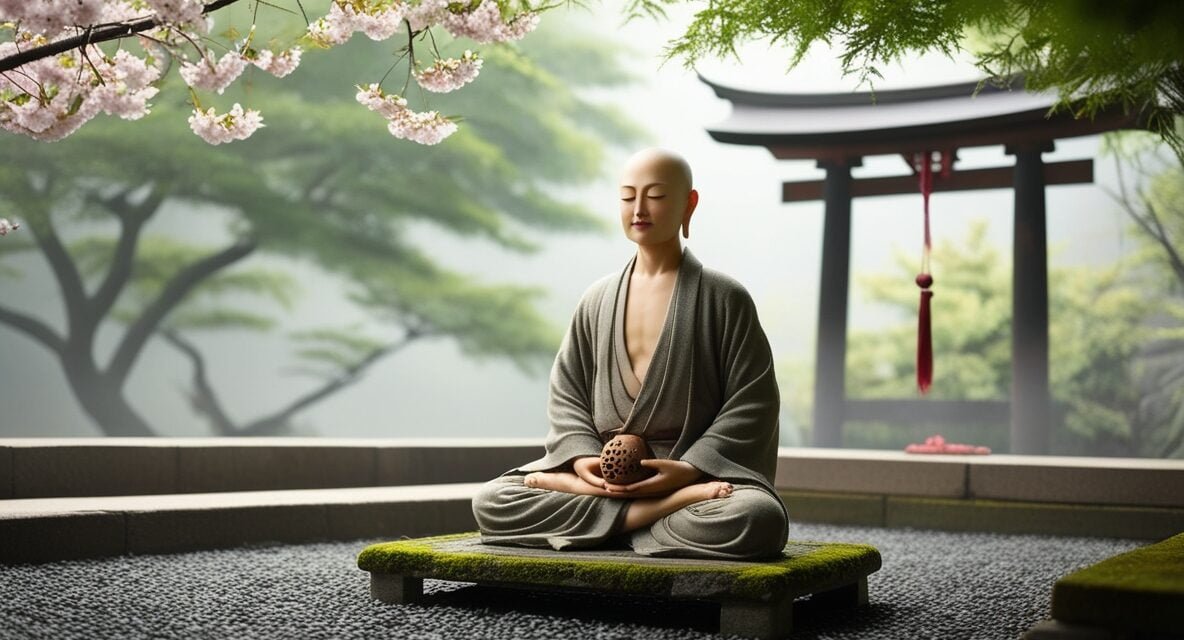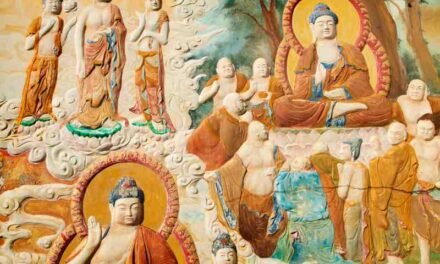Koan: The Zen Paradox That Can Change Your Life
In Zen Buddhism, the koan is a unique and powerful tool used for meditation and spiritual development. A koan presents a paradoxical question, story, or statement that defies logical reasoning. This lack of clear, straightforward meaning is deliberate—it encourages the mind to go beyond conventional thinking. By meditating on these puzzles, practitioners are forced to explore deeper levels of awareness and self-understanding.
Zen koans are known to challenge the very nature of our thoughts and perceptions. They can seem bewildering, but that’s where their transformative power lies. The tension between the mind’s desire for clarity and the koan’s elusiveness can lead to profound insights. As you delve into a koan, you may discover that life’s mysteries and paradoxes are not meant to be solved, but embraced.
The Koan: A Mind-Bending Puzzle with Profound Wisdom
At first glance, koans appear as simple yet confusing phrases. Consider a famous example: “What is the sound of one hand clapping?” At face value, this question makes no logical sense. However, the koan isn’t about finding a rational answer. Instead, it invites practitioners to step outside the confines of analytical thought and engage with deeper truths.
The wisdom of a koan is often hidden beneath layers of contemplation. Each koan is designed to disrupt habitual patterns of thinking. By focusing on the paradox, the practitioner enters a state of “non-thinking,” where the boundaries of ordinary perception dissolve. This process fosters a profound inner transformation, allowing individuals to experience reality beyond the limitations of language and logic.
Koan Practice: Beyond Words and Thoughts
Zen koans are not intended to be solved in a traditional sense. They are designed to be experienced, often through meditation, where the practitioner holds the paradox in their mind without seeking a definite answer. In this way, the koan becomes a mirror reflecting the practitioner’s own mental patterns and attachments.
The journey of working with a koan takes place beyond words and thoughts. It involves stilling the mind and allowing the paradox to permeate one’s consciousness. With time, practitioners may experience moments of clarity where the koan reveals its deeper meaning. This moment of realisation, known as kensho in Zen, is a glimpse into one’s true nature—a moment of awakening.
The Koan: A Catalyst for Spiritual Awakening
The ultimate purpose of a koan is not to stump the intellect but to trigger a spiritual awakening. It can act as a powerful catalyst for deep self-realisation. As the practitioner grapples with the paradox, the mind slowly loosens its grip on the need for certainty. In doing so, the practitioner transcends the duality of thought and opens themselves to the experience of pure awareness.
Historically, Zen masters have used koans to test the spiritual maturity of their students. When a student arrives at a genuine insight, they often respond to the koan with a creative expression or action, rather than a verbal answer. This direct, experiential understanding signals a breakthrough in their spiritual journey, propelling them toward enlightenment.
Practical and Informative
How to Practice Koans: A Beginner’s Guide
If you’re interested in practising koans, you don’t need to be an expert in Zen or meditation. Koan practice is accessible to anyone willing to engage with the mysteries of the mind. Here are some basic steps to get you started:
- Find a Quiet Space: Start by sitting in a comfortable, quiet place where you won’t be disturbed. Close your eyes, and take a few deep breaths to relax.
- Choose a Koan: Select a koan that resonates with you. You can begin with a well-known koan, such as “What is the sound of one hand clapping?” or “What was your original face before you were born?”
- Sit with the Koan: Bring the koan to mind and allow it to sit with you in your awareness. Don’t try to figure it out or analyse it. Simply let the words settle in your mind.
- Stay Open: Remain open to whatever arises—whether thoughts, feelings, or confusion. The goal is not to find an answer but to observe how your mind responds.
- Be Patient: Koan practice takes time and persistence. The insights may not come immediately. Continue to meditate on the koan regularly without forcing a solution.
Koan Practice: Tips and Techniques
Although koan practice may seem difficult at first, there are several techniques that can help deepen your experience:
- Work with a Teacher: A Zen teacher or guide can offer valuable support during your koan practice. They can help you select koans suited to your level and provide guidance as you navigate the complexities of the practice.
- Use Mindfulness: Approach the koan with mindfulness. Pay attention to your thoughts and emotions as they arise, but don’t get attached to them. Let them pass, and return your focus to the koan.
- Be Gentle: Don’t be too hard on yourself if the koan remains elusive. The point is to observe and experience, not to judge or critique your progress.
- Trust the Process: Trust that the koan is working on you, even if you don’t see immediate results. Over time, your understanding will deepen as your mind becomes more flexible and open.
Understanding Koans: A Deeper Dive
To fully appreciate koans, it’s important to understand their place in the broader context of Zen Buddhism. Zen teaches that enlightenment cannot be grasped through intellectual means alone. Koans reflect this idea by disrupting the rational mind and opening the door to non-conceptual awareness.
Each koan is crafted to highlight a particular aspect of the spiritual path. For example, some koans focus on the nature of self, while others challenge our perceptions of reality. In essence, a koan is a tool for unlocking the deeper layers of consciousness and connecting with the essence of being.
Zen practitioners often study koans in a systematic way, progressing from simpler puzzles to more complex ones as their understanding deepens. The journey through koans is a gradual process of shedding mental attachments and uncovering one’s true nature.
Koan Practice: Benefits and Challenges
While koan practice offers profound spiritual benefits, it also comes with its own set of challenges. Let’s explore both sides of the practice:
Benefits of Koan Practice:
- Expanded Awareness: Working with koans helps expand your awareness beyond logical thinking. It opens the door to intuitive understanding and spiritual insight.
- Mental Flexibility: Koans train the mind to be more adaptable. As you learn to engage with paradoxes, your thinking becomes less rigid, allowing you to approach life’s challenges with greater creativity and openness.
- Self-Realisation: Over time, koan practice leads to moments of deep self-realisation. These breakthroughs offer glimpses into your true nature, bringing you closer to spiritual awakening.
- Inner Peace: As you let go of the need for certainty, you may find a sense of inner peace. The mind becomes quieter and more centred, allowing you to experience life with greater clarity and calm.
Challenges of Koan Practice:
- Frustration: One of the most common challenges of koan practice is frustration. The mind naturally wants to solve problems, and koans resist this instinct. It’s easy to feel stuck or confused, especially in the beginning.
- Patience: Koans require patience. Insights may not come right away, and the process can feel slow. It’s important to stay committed and trust that progress is being made, even if it’s not immediately apparent.
- Letting Go of Logic: For many people, letting go of logical thinking can be difficult. The practice of embracing paradoxes and contradictions may feel uncomfortable or unnatural at first.
- Working Alone: Without the guidance of a Zen teacher, koan practice can be challenging. A teacher can offer insights and feedback that are crucial to advancing in the practice.
Koan practice is a unique and transformative path that challenges the very foundations of our thinking. While it may seem puzzling at first, the rewards of this practice are profound. By embracing paradox, letting go of the need for answers, and allowing the mind to experience the depths of awareness, practitioners can unlock a deeper understanding of themselves and the world around them.
Whether you’re a seasoned meditator or a beginner, working with koans offers a journey toward spiritual awakening, inner peace, and expanded consciousness. It’s a practice that can change your life—not by giving you answers, but by helping you ask the right questions.





